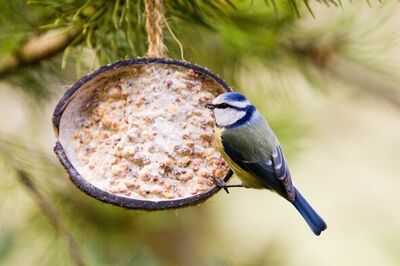
Wildlife experts are urging households not to use bird feeders in their gardens in July as they attract pigeons, who eat all of the food quickly and leave nothing for other birds.
Not only does this mean feeders constantly need refilling, but by attracting pigeons into gardens this can discourage smaller birds from visiting as they are intimidated by their larger size, so it means other wildlife have less access to food. While feeding birds used to be a winter activity, experts say birds actually need help finding food during the summer months too. There is generally more natural food available to birds in summer, but supplementary feeding is helpful to esnure birds have enough energy and protein to build their nests and feed their young.
Kenned Wild Bird Food says: "With new bird populations being in abundance and the warm (often still wet in Britain) weather, many believe that birds have access to natural food sources and so feeding birds from your garden will make them lazy and complacent.
"Wild birds in fact receive around 25% of their daily intake from bird feeders, some even lower. That's why, during summer and the time when birds are returning to British gardens and protecting their young, giving them an extra boost of energy in bird seed is important."
But leaving food out on bird tables can invite pigeons into your garden and inadvertently cause other birds to miss out on food as pigeons can be both greedy and intimidating to small species.
To combat this problem, Richard Green, wildlife expert from Kennedy Wild Bird Food & Pet Supplies, says that households should instead add seed trays to feeders as this helps to reduce the amount of seeds that are dropped on the ground, which often lures pigeons in.
It's also recommended that if you have a bird feeder in your garden, you should add a cage around it as this allows small birds to still reach the food but larger birds, like pigeons, won't be able to get to it. Alternatively, you can opt to use pigeon-proof designed feeders which are often angled so that the birds struggle to get a good grip.
Mr Green explains: "Fallen seed is a major attraction for pigeons and other pests, such as rats. Adding seed catchers beneath feeders helps stop seeds from reaching the ground. It's also important to regularly clean up any remaining food to keep your garden tidy and free from unwanted visitors.
"Feeders designed to keep pigeons away often feature vertical or angled surfaces that pigeons struggle to grip. Pigeons are not as agile as smaller birds, so creating feeding spaces with uneven or narrow perches can make a big difference in keeping them at bay."
Another option to prevent pigeons stealing all the food from other birds is to put out things like nyjer seed, suet balls or sunflower hearts, as these are less appealing to them so it gives smaller birds a better chance to enjoy the food on offer.
Of course, if you want to keep feeding pigeons in your garden, without excluding smaller birds, it's advised that you set up separate feeding areas.
Mr Green adds: "Ground feeders with high-cereal seed mixes are ideal for pigeons, while smaller, more protected feeders can be reserved for smaller species. This allows all birds to enjoy your garden without competing for food."